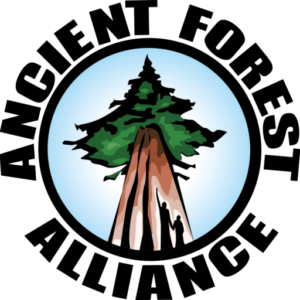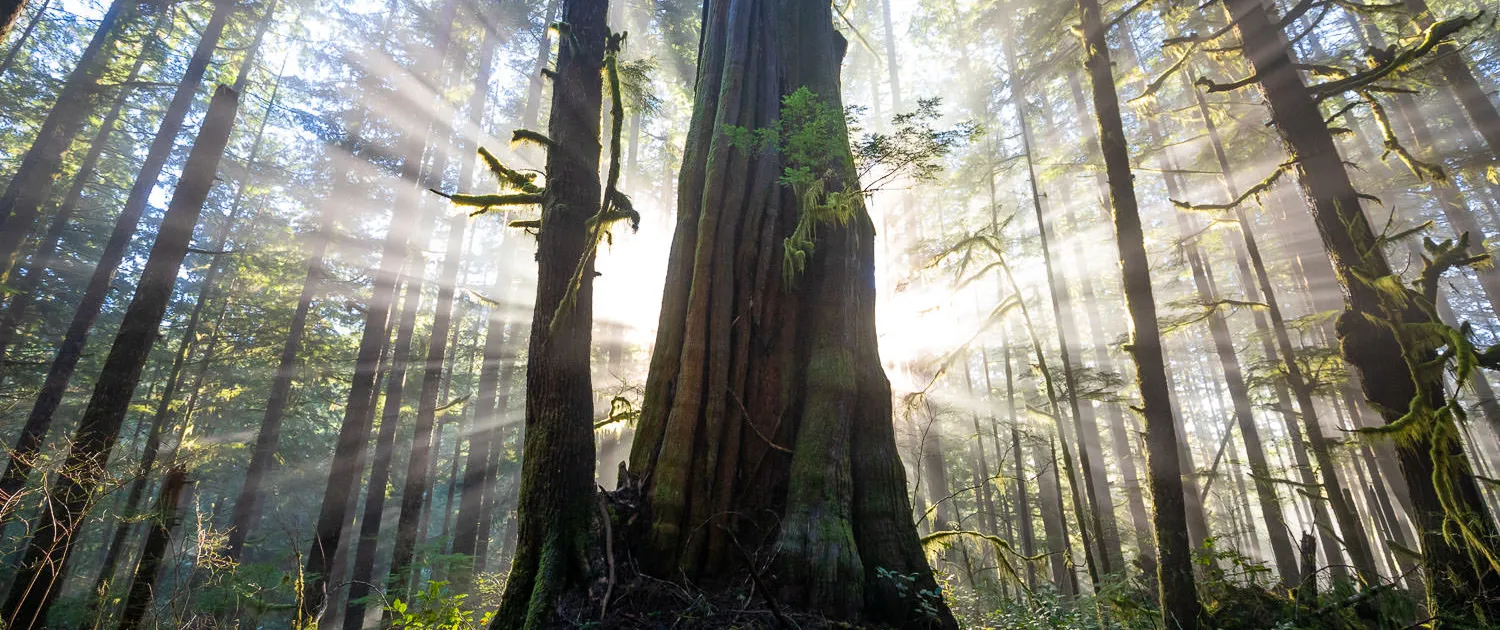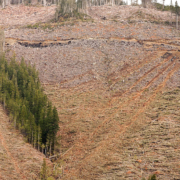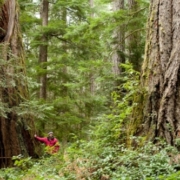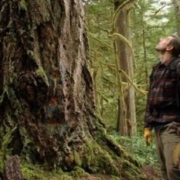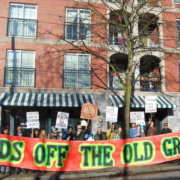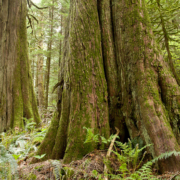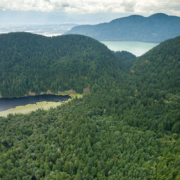Alberni groups protest McLaughlin logging
/in News Coverage/by TJ WattMore than 80 people gathered at Echo Centre Monday for a meeting hosted by the Watershed-Forest Alliance in its quest to protect an old-growth forest at McLaughlin Ridge and in the China Creek Watershed.
Alberni-Pacific Rim MLA Scott Fraser and retired government scientist Doug Janz were guest speakers at the event.
The pair were resolute: that the forest range needs to be protected with enhanced regulations.
“McLaughlin Ridge is critical winter range for deer and elk. Weyerhaeuser and Mac Blo saw this and left it untouched,” Fraser said. “The area is a unique system for many different species.”
Fraser retraced the history of the issue.
McLaughlin Ridge was removed from a tree farm licence in 2004 by then-owners Weyerhaeuser and is now considered privately managed forest land.
Provincial officials wanted critical winter habitat protected for two years and a committee would subsequently decide the form of protection.
The province and Island Timberlands disagreed on critical issues and the company ceased meeting in 2009. Harvesting plans were not science-based, government biologists said. “We asked Island Timberlands not to go into McLaughlin but at the end of the day it was their land,” Fraser said.
Groups have a bit of breathing room as logging has thus far occurred only in the lower areas and not on the upper ridge. And logging isn’t expected to start again until next spring, Watershed-Forest Alliance chair Jane Morden said.
The group will continue talks with Island Timberlands about stalling logging in the area.
The group doesn’t have a beef with the company, Morden said. “Island Timberlands has the legal right to do what it’s doing,” Morden said. “But the government erred in not following through with its intent to pursue winter ungulate ranges.”
Original article no longer available: https://www.albernivalleynews.com/news/180526621.html
Cortes Island citizens prepare for logging protests
/in News Coverage/by TJ WattLanky, clean cut Cec Robinson is pretty sure the RCMP has been following him on Cortes Island. What danger does this quiet oyster farmer and family man pose? He intends to defend his island from industrial logging by Island Timberlands because he thinks it is the right thing to do for his community and for the planet.
Here are his words:
I am 62 years old, and for the last 23 years, a full time resident of Cortes Island, where my wife and I raised our daughter and son. This truly rare place is still a tapestry of diverse, healthy ecosystems, and I will peacefully block any industrial style logging on Cortes.
As a self-employed shellfish grower, I appreciate free enterprise. I say yes to modest sustainable timber harvest that protects sensitive areas and keeps most of the economic benefit within our community.
I also know that we must all be subject to reasonable constraints in order to protect society from carelessness and greed. In the case of corporately owned forest lands in BC, there are no such constraints. Our government ignores its responsibility, and instead allows these multi-national corporations, such as ‘Brookfield Asset Management’, to self-regulate.
Brookfieldwants to take our environment and convert it into cash for their distant shareholders. They want only to take! To take far too much and far too fast, and when will they give back? Back to the living earth that provided their excessive wealth, and back to my home, Cortes Island. With the last truckload of raw logs exported to China, what would Cortes Islanders be left with? A divided community with a degraded environment, reduced natural resources, tourism dollars lost. All this when climate change is bringing our children a greater need than ever for their environment to be as healthy, productive and abundant as possible.
It may be legal, but it is highly unjust for a corporation to do this to our community and environment. We’ve written the letters and we’ve had the meetings. The corporation responded poorly, and the government, even less so. That leaves only you and me, until we have new legislation which determines that logging be more sustainable.
I love this earth, and I love our children, and I will fight to defend what I love. I will stand in the way, peacefully, 100 per cent, arrest or not. I will not be alone, and we will be there until we have achieved something wonderful.
Who is this sincere, upstanding citizen pitting himself against? Island Timberlands, which plans to industrial log Cortes Island is owned by Brookfield Asset Management with $110 billion in managed assets and bcIMC with $92 billion in managed assets. Most recently, China Investment Corporation, a sovereign wealth fund which manages China’s foreign exchange reserves and has $410 billion in assets, has negotiated for a 12.5 per cent stake in Island timberlands.
These institutional owners first extract profits from forest liquidation and then from conversion of forests to residential development, known in corporate vernacular as a “higher and better use.” At its current rate of logging, Island Timberlands will destroy all its Douglas fir forest holdings within 25 years.
Cec is not the only islander to think that Cortes is caught up in a larger trend of destruction that serves no one who depends on the Earth for healthy existence. More immediately, dozens of island business owners have made it clear that Island Timberland’s industrial logging will occur at the expense of their livelihoods.
Cortes Islanders have historically advocated truly sustainable forest management for high end wood working markets. In contrast, Island Timberlands uses the discredited “Sustainable Forestry Initiative” certification, an industry scheme that bears no relation to the more stringent and credible “Forest Stewardship Certification.”
Nearly 7,000 people have signed a petition asking Island Timberlands to stand down from industrial logging on Cortes Island. That petition resulted in a delay of Island Timberlands’ logging plans for 10 months of negotiations and a temporary commitment to not cut some of the old growth. But IT ultimately refused to meet the substance of the petition which sought permanent protection for old growth, water sheds, listed species and sustainable selective logging.
Please send an email for the forests of Cortes:
IT CEO Dashan Sihota: dsihota@islandtimberlands.com
IT Operations Planner Wayne French: wfrench@islandtimberlands.com
IT Director of Forest Operations Bill Waugh: BillWaugh@islandtimberlands.com
IT Public Relations Morgan Kennah: MKennah@islandtimberlands.com
bcIMC contact:
CEO/CIO, bcIMC: doug.pearce@bcimc.com
Brookfield Asset Management contact:
BAM CEO Bruce Flatt: bflatt@brookfield.com and kvyse@brookfield.com
Read more: https://www.vancouverobserver.com/blogs/earthmatters/cortes-island-citizens-prepare-logging-protests
Will logging of ancient forest be halted before it can begin?
/in News Coverage/by TJ WattResidents of Cortes Island have formed a blockade to stop the BC based timber company, Island Timberlands (I.T.), from beginning logging operations in one of BC’s last stands of old growth coastal Douglas-fir forest. For over four years, community members have attempted to work with the company to develop an ecosystem-based approach to forestry. As road-building equipment moves in, the community is now left with no choice but to stand in it’s path to defend these ecologically significant forests.
Yesterday, Island Timberlands trucks were stopped at a logging road gate by two protesters lying on the ground. Company personnel filmed the protesters, likely in preparation for an application for a civil injunction. The protesters did not respond to their questions and community members remained on the site until the end of the day.
Adjacent landowners were among the community members present. One couple explained that they have a water license on Basil Creek which runs through Island Timberlands’ property. I.T. plans to log in the riparian area and within 30 feet of the wetland that feeds the salmon-bearing creek. They wrote to Morgan Kennah, Island Timberland’s Manager for Community Affairs, stating their concerns about water supply and contamination. “I thought I would get a letter from Morgan assuring me that my water supply would be safe,” the landowner stated, “but that never happened. I got no response.” Another community member showed up with Christmas decorations and a Christmas tree to lighten the protesters’ spirits.
Leah Seltzer explained the situation in this way, “People are here because they want to make it known that the industrial forestry model doesn’t work for local communities and it doesn’t work for the province. Island Timberlands will destroy ecologically sensitive ecosystems and leave nothing beneficial in its wake. We will be left with devastated ecosystems, a contaminated water supply and no long-term jobs. All the benefit is going to people who live far away and who aren’t aware of the cost of their profits to our community and our province.”
The threatened lands contain some of the last 1% of old-growth Coastal Douglas-fir forests, and, according to Ken Wu of the Ancient Forest Alliance (AFA), are some of the most extensive stands remaining in the endangered “Dry Maritime” forests along BC’s southern coast. The forests also contain a number of documented threatened species and sensitive ecosystems.
At this time, I.T. has contracted several local workers but these jobs will only provide short-term employment. More than 60% of I.T.’s raw logs are shipped out of the province to be processed overseas. Standing exclusively to profit are I.T.’s corporate shareholders, which include Brookfield Asset Management and the BC Investment Management Corporation, the pension fund for provincial employees.
While I.T. claims to use sustainable forestry practices, long-time forest activist and Cortes Island land-owner, Tzeporah Berman, warns us not to be fooled: “The majority of their logging is traditional clearcut logging with devastating ecological implications that result in either a change of land use or a dramatically weakened and simplified ecosystem. The Sustainable Forestry Initiative (SFI) that Island Timberlands touts does not ensure strong environmental standards and has little support from First Nations or environmental organizations.”
Cortes resident and Greenpeace co-founder Rex Weyler agrees. “There’s no excuse for industrial-scale logging in these times,” he says. “Forward-looking and economically-viable alternatives exist that are based on community health and ecosystem health. Island Timberlands’ plans are a step backwards. Cortes Island is moving forward.” Residents have sought Island Timberland’s participation in this kind of forestry model but have been met with disregard.
Community members hope that the situation will not escalate, and that I.T. will recognize that Cortes holds a rare opportunity to work with a willing community to create a forestry model that benefits everyone. Until then, islanders will be standing in the way of the equipment, and keeping a close eye on any further signs of I.T. activity on the island.
Read more: https://wildstands.wordpress.com/
Sing Tao Daily
/in News Coverage/by TJ Wattå‘è©©çœå¤æ¨¹è¯ç›Ÿï¼ˆAncient Forest Alliance)20個支æŒè€…,周å…下åˆ1時在çœé•·ç°¡è•™èŠï¼ˆChristy Clarkï¼‰æ–¼æº«è¥¿æ ¼é›·å²¬ï¼ˆPoint Grey)é¸å€è¾¦å…¬å®¤å¤–示å¨ï¼Œè¦æ±‚çœåºœæˆç«‹ä¸€å€‹å‘è©©å¤è€æ£®æž—ä¿è·è¨ˆåŠƒï¼Œé˜»æ¢ç ä¼æº«å“¥è¯å³¶åŠä½Žé™¸å¹³åŽŸç‰åœ°å€çš„çè²´å¤æ¨¹ã€‚王露æ”
Read more: https://news.singtao.ca/toronto/realtimenews/details.php?IndexID=2853014
A UBC student campaign wants to help you kick your paper-towel habit
/in News Coverage/by TJ WattSam Dabrusin wants to save the environment — one hanky at a time.
He’s giving out free handkerchiefs at UBC, hoping that anyone who takes one will use the hanky, rather than a paper towel, to dry their hands after they use the washroom.
It all started when Dabrusin, now a third-year political science student at UBC, went on a high-school exchange to Japan. “For the first month or so, my hands were always wet; I was wiping them on my pants,” he said. “They don’t have paper towels or hand dryers in over 90 per cent of the bathrooms there.
“It’s the cultural norm to carry around a handkerchief…. Then when I got back to North America, I started using [handkerchiefs] again without thinking.”
While canvassing for Greenpeace after his first year of university, Dabrusin tried to think up a project he could start to help the environment, and his mind went to his hanky habit.
“I made the connection in my head that [paper towels] were dead trees that we just throw in the garbage…. I was just using less.”
Dabrusin approached the sustainability committee at the AMS student society, and he learned how much paper towel waste comes from just the Student Union Building. “I found out the SUB goes through about 40 bags of trash a day, just out of the bathrooms,” he said. “At least 90 per cent of that, or more, is going to be paper towels, right?”
He made a pitch to the AMS about a plan to offer free hankies outside bathrooms, but they weren’t able to offer him grant money for the project.
“We didn’t see the connection between buying a handkerchief and then getting people to consistently use a handkerchief instead of paper towel,” said Tristan Miller, AMS VP Finance.
Undeterred, Dabrusin wound up getting $1,100 for his project from another group, the Student Environment Centre. He used it to buy hundreds of handkerchiefs from Hankettes, a Vancouver Island company.
He’s been handing them out at a booth in the SUB since Tuesday, and suggesting that anybody who takes one also donate to the Ancient Forest Alliance. “The response has been pretty good,” he said. “It’s a behaviour change thing, so it’s a big project. We’re aiming to do this next semester as well.”
Dabrusin hopes that the project won’t just save trees, water and energy; he also wants it to get people thinking about how much they consume.
“This is a really good way to get into a discussion about the disposable culture that we have right now…. On campus, we’ll have a meal and we’ll throw out some plastic, we’ll throw out some styrofoam, all without thinking about it.
“We’ll do that on a daily basis, and that’s just for meals, you know? There’s so much other stuff, too, that’s very disposable. I think this would be a good way to start that conversation.”
Manage forests for the future
/in News Coverage/by TJ WattAs it looks for ways to shore up the province’s timber industry, the B.C. government is in danger of not seeing the forest for the trees.
The harvesting of pine beetle-damaged logs is winding down, and now lumber mills in the Interior face a shortage of logs. The government, as it should, is looking for the means to save jobs and keep the industry viable.
Among the remedies considered are reviewing restrictions on logging environmentally sensitive areas and marginally economic stands, and giving lumber companies more leeway to manage forest lands.
The possibility of opening previously protected old-growth forests to logging has stirred concerns – with reason. B.C. groups and residents have fought for years to protect old-growth forests, and the case has already been made for preserving these irreplacable resources. The public will not stand for invading these special places.
The government plans to re-examine areas where logging has been considered economically marginal, and to take another look at restrictions on forest reserves.
What is needed is a full-scale forest inventory. Much of the data available is decades old, and has likely been thrown out of whack by the pine-beetle infestation.
No business that sells a commodity can get by without taking inventory regularly. You don’t know what you can sell until you know what you have.
The calculation should not be how many trees are needed to support a certain number of jobs, but how many jobs will be supported by trees available through sustainable harvest. The hard truth might well be that logging should be scaled back.
Forests Minister Steve Thomson said any decisions to cut old-growth forests will be based on science, but the science used should be forestry, not political science or economics. It should look not only at the quantity of lumber, but the entire ecosystem. A forest is more than a certain quantity of two-by-fours, it’s a system that supports wildlife, generates tourism and recreation and protects watersheds. Grants for graduate students
Is it possible to have a healthy forest and still harvest timber? Of course – not only is it possible, it’s essential. Using up the timber supply faster than it can be replenished means the end of the forest, the killing of the goose that lays the golden egg. No forests, no lumber industry, no jobs.
Noted forester Merve Wilkinson proved the worth of good forestry practices on his 28 hectares of forest near Nanaimo. After 60 years, he had taken twice the original volume of lumber from the property and was still left with 110 per cent of the volume. Wilkinson, who died in 2011, sold his property, known as Wildwood at Yellow Point, to The Land Conservancy so it could continue to be a showpiece of forestry.
The methods used in a relatively small parcel might not translate easily to large tracts, but the principles should be closely examined to see how they can be implemented on a larger scale.
If forests are depleted for short-term profit, you can be sure the result will be long-term pain.
Read more: https://www.timescolonist.com/opinion/letters/manage-forests-for-the-future-4563319
Vancouver’s East Side Games join cause to protect bald eagle habitat
/in News Coverage/by TJ WattEast Side Games CEO Jason Bailey announced Wednesday that the company has given a “significant” cash donation and will provide online social media support for the Ancient Forest Alliance (AFA).
The social and mobile gaming company, founded in July 2011, is Canada’s largest independent game developer with one million fans on Facebook.
In the past year, Bailey said, more than seven million people have played their games.
AFA is trying to save a 50-hectare old-growth forest at Echo Lake, east of Mission, that is home to hundreds of roosting eagles.
He said even though they do not have plans to specifically build a themed game around Echo Lake, they are integrating parts of the campaign into their games.
“There is a plan … to take one of the trees or an eagle character and put it directly into the games … and make it one of the awesome items in the game that you really want to have, which will increase awareness of this campaign,” Bailey added.
AFA’s executive director Ken Wu said Echo Lake is one of the last lowland old-growth forests remaining in the entire Lower Mainland.
The B.C. government’s newly proposed old-growth management area, Wu said, would protect a portion of Echo Lake, but would exclude areas containing some of the lake’s old-growth trees.
A 60-day public review into the proposed management plan ends Nov. 5.
Video-game firm joins effort to protect bald eagle habitat
/in News Coverage/by TJ WattEast Side Games announced its support for the Ancient Forest Alliance initiative during a news conference Wednesday. Jason Bailey, the video-game company’s chief executive officer, said he is writing a “significant” cheque to the environmental group. But he said the company’s contribution won’t stop there.
“There is a plan to integrate this campaign directly into the games,” Mr. Bailey said. “… to take an eagle character and put it directly into the games … and make it one of the awesome items in the game that you really want to have – that will also increase awareness of this campaign.”
The Ancient Forest Alliance is trying to save about 50 hectares of old-growth forest at Echo Lake, east of Mission. Ken Wu, the organization’s executive director, said the area is home to hundreds of roosting bald eagles each fall, and also features giant red cedar trees and extremely rare old-growth Douglas firs.
The B.C. government last month invited the public to comment on Fraser Valley land-use plans. The deadline is Nov. 5. A spokeswoman for the Ministry of Forests said last week concerns about Echo Lake will be considered in the process. She said the province is looking at a proposal to designate 1,500 hectares in the area for wildlife management, which could protect winter feeding areas for eagles. Nursing grants for college
Mr. Wu said while the B.C. government’s proposed old-growth management area would protect a portion of Echo Lake’s old-growth forests, it doesn’t go far enough.
Read more: https://www.theglobeandmail.com/news/british-columbia/video-game-firm-joins-effort-to-protect-bald-eagle-habitat/article4619452/https://www.theglobeandmail.com/news/british-columbia/video-game-firm-joins-effort-to-protect-bald-eagle-habitat/article4619452/
Vancouver Tech Company throws its Weight behind Saving BC’s Old-Growth Forests and Bald Eagle Habitat
/in News Coverage/by TJ WattThe campaign to protect British Columbia’s endangered old-growth forests has gained a unique and powerful new supporter: East Side Games is an independent, Vancouver-based tech company that specializes in developing online games for social media and mobile platforms and that has over one million Facebook fans around the world. It is the largest social and mobile game developer in Vancouver.
The company (https://eastsidegamestudio.com) is providing online social media support for the Ancient Forest Alliance (https://16.52.162.165) to help raise awareness and to mobilize the public to protect BC’s endangered old-growth forests, along with a substantial donation. The campaign includes a focus on saving a magnificent stand of old-growth trees at Echo Lake east of Mission, home to hundreds of roosting bald eagles each fall.
The extent of company’s social media reach to help the environmental campaign was demonstrated last week when almost 6000 people “shared” a Vancouver Sun article about the Echo Lake Ancient Forest after it was posted on one of Eastside Games’ Facebook fan pages
(see the article at: https://www.vancouversun.com/search/Province+urged+protect+Harrison+eagles/7371025/story.html)
The company’s CEO, Jason Bailey, is a former environmental activist who worked with the Ancient Forest Alliance’s (AFA) executive director, Ken Wu, over 20 years ago to protect old-growth forests through a small East Vancouver environmental group. Bailey is challenging other Vancouver tech companies to also come forward and support the AFA’s campaign, and will also match the donations of any Eastside Game employees who wish to support the AFA. Over 4 million people have played East Side Games’ Facebook games over the past three years, and Bailey will begin using the network to help promote the AFA’s petition-drives, letter-writing campaigns, and awareness-raising efforts to protect BC’s ancient forests.
“BC’s economy has diversified over the past 20 years and is no longer dominated by old-growth logging. BC’s tech sector is now a major and growing economic engine in the province, employing 80,000 people – almost twice that of forestry in the province. The skilled labour force that the tech sector draws from has chosen to locate in BC in large part because of its natural beauty and the work-life balance provided by its forests, mountains and wild coast,” stated Jason Bailey, Eastside Games CEO. “We’ll be providing major social media and financial support for the Ancient Forest Alliance. We’ll be leveraging our tech industry connections as well as our millions of local and international users to bring more awareness to BC’s natural beauty and the threat that it is under. My staff and I were really blown away by the magnificent ancient trees upon visiting Echo Lake last summer, and I’m determined to help see the area protected.”
“While the tourism sector has supported the ancient forest movement in BC, this will be the first time that a major tech business has weighed-in to help that I’m aware of. Social media in today’s world can have a public reach on par with the major news media in some cases, and East Side Games’ support with their one million plus Facebook fans will represent an unprecedented surge in social media awareness for BC’s ancient forests. In addition, being a small and new organization, their generous donation to the Ancient Forest Alliance will go exceptionally far to help our campaigns,” stated Ken Wu, the AFA’s executive director. “I hadn’t seen Jason in literally 20 years until a few months ago when we met in a Vancouver taco shop. I’m impressed that he’s still basically the same guy who loves nature and supports environmental activism– except that today he’s not the broke East Van hippie that I knew back then. His circumstances have changed, he’s grown up as we all have, and he has much more powerful means at his disposal to help the cause and is putting them into effect now – for which we’re most grateful.”
The Ancient Forest Alliance has launched a new campaign to protect one the last endangered lowland old-growth forests left in the Lower Mainland at Echo Lake between Mission and Agassiz. The lake includes a spectacular, monumental stand of giant redcedars and extremely rare old-growth Douglas firs, 99% of which have already been logged on BC’s coast. Virtually all low elevation old-growth forests in the region have been now been logged, with most remaining old-growth stands consisting of smaller trees at higher altitudes on steep slopes. The area is in the traditional, unceded territory of the Sts’ailes First Nations band (formerly the Chehalis Indian Band).
See SPECTACULAR photos of Echo Lake’s ancient forest at: https://16.52.162.165/photos-media/
In September, the BC Ministry of Forests, Lands, and Natural Resource Operations launched a 60 day public review ending on Nov.5 of proposed Old-Growth Management Areas that would prohibit logging as part of the process to complete the land use planning process in the Chilliwack Forest District. See: [Original article no longer available]
Unfortunately, while the BC government’s newly proposed Old-Growth Management Area for Echo Lake would protect a portion of its old-growth forests on the south side of the lake, it would exclude some of the finest old-growth stands on the west and north sides of the lake.
Echo Lake is home to one of the largest concentrations of bald eagles on Earth. Thousands of eagles come each fall to eat spawning salmon in the Harrison and Chehalis Rivers and hundreds of eagles roost in the old-growth trees at night around Echo Lake. It is also home to a large array of biodiversity including bears, cougars, bobcats, deer, mountain goats, and osprey, and until recent times was populated by the critically endangered northern spotted owl.
The vigilance of local landowners on the east side of Echo Lake, whose private lands restrict public access to the old-growth forests on the Crown lands on the west side of the lake, have held-off industrial logging of the lake’s old-growth forests thusfar. Across the southern coast of BC, over 80% of the original, productive old-growth forests have already been logged.
While the Ancient Forest Alliance is calling for the protection of Echo Lake’s forests, the organization is primarily calling for a larger provincial plan to protect the remaining endangered old-growth forests across BC while expanding sustainable second-growth forestry jobs. In particular, some of the key policy shifts the organization is calling for include:
- A Provincial Old-Growth Strategy that would inventory the remaining old-growth forests in BC and protect them in regions where they are scarce (egs. Vancouver Island, the Lower Mainland, southern Interior, etc.)
- A shift to sustainable logging in second-growth forests, which now constitute the vast majority of forested lands in southern British Columbia.
- An end to the export of raw logs to foreign mills in order to ensure a guaranteed log supply for BC mills and value-added manufacturers.
- See the stunning photogalleries and videos of BC’s coastal old-growth forests on the Ancient Forest Alliance’s website at: https://16.52.162.165/photos-media/
“How many jurisdictions on Earth still have trees that grow as wide as living rooms and as tall as downtown skyscrapers? And how many jurisdictions still consider it okay to turn such trees in giant stumps and tree plantations? What we have here in BC is something exceptional, the likes of which won’t be seen again for a long, long time if they are logged,” stated AFA executive director Ken Wu. “More than ever we need the BC government to have the wisdom and courage to move ahead with a plan that protects our endangered old-growth forests, ensures the sustainable logging of second-growth forests, and ends the export of raw logs to foreign mills”.
“Having had some successes in recent years with my entrepreneurial endeavours, I am fortunate to be in a position to give back to this province in more ways then just paying large tax bills. Together with the tech community we can help to protect these exceptionally beautiful ancient trees and ecosystems for future generations while continuing to diversify the economy by creating more jobs in non-resource based industries.”
Recent News articles:
Interesting links
Here are some interesting links for you! Enjoy your stay :)Pages
- ACTION ALERT: Tell the NDP government FRPA amendments must protect old-growth forests
- AFA Policy Recommendations – 2025
- Ancient Forests
- BC Protected Areas Strategy (PAS)
- Before & After Logging – Caycuse Watershed
- Before and After Logging Caycuse 2022
- Biggest Trees
- Bugaboo Ridge Ancient Forest
- Call Premier Horgan to demand funding for old-growth protection in Budget 2022
- Call the BC government
- Cameron Firebreak
- Canada’s Most Impressive Tree – Flores Island
- Cast Your Vote for Ancient Forest Protection!
- Caycuse Logging From Above
- Central Walbran Valley
- Climbing the Largest Spruce in Carmanah
- Conservation Financing
- Contact
- Donate Stocks, Securities, and Mutual Funds
- Echo Lake
- Economic Valuation of Old-Growth Forests on Vancouver Island
- Ecosystem-Based Targets
- Edinburgh Mountain Ancient Forest
- Eldred River Valley
- Exploring & Climbing Ancient Giants
- Fairy Creek Headwaters
- Granite Creek Logging
- Grove of Giant Cedars Clearcut in Quatsino Sound
- Have your say on the BC government’s Old-Growth Strategy
- Hiking Guides
- Home
- Join the Growing Number of BC Businesses Calling for Old-Growth Forest Protection
- Juniper Ridge
- Kanaka Bar Indigenous Protected and Conserved Area
- Kanaka Bar IPCA Proposal
- Katlum Creek
- Katlum Creek
- Klaskish Inlet
- Loup Creek
- Lower Caycuse River
- Mahatta River Logging
- Massive Trees Cut Down
- McKelvie Valley
- McLaughlin Ridge
- Mossy Maple Rainforest
- Mount Horne
- Mt. Freda Ancient Forests
- Nahmint Logging 2024
- Nahmint Valley
- Nahmint Valley
- Old Growth Strategic Review Questionnaire Guide
- Old-Growth 101 – The Facts on Ancient Forests in BC
- Old-Growth Campaigns
- Old-Growth Forest Hikes Near Port Renfrew
- Old-Growth Forest Hikes Near Victoria BC
- Our Mission & Team
- Our Work
- Petition
- Photographer TJ Watt
- Photos & Media
- Policy recommendations to support sustainable, value-added, second-growth forestry jobs in BC
- Pop for Parks Report
- Privacy Policy
- Protect Old-Growth Forests & Endangered Ecosystems in BC
- Provincial Biodiversity and Ecosystem Health Framework
- Provincial Land Acquisition Fund
- Quatsino Old-Growth Under Threat 2023
- Recent News
- Salmon Parks Initiative
- Send a Message
- Send a Message
- Send a Message
- Spruce Bay Old Growth Trail – Port Alice
- Sydney River Valley
- Taylor River Valley
- Thank you for speaking up for ancient forests!
- Thank you for speaking up for BC’s last remaining ancient forests!
- Thank you for speaking up for BC’s last remaining ancient forests!
- Thank you for speaking up for endangered ecosystems!
- Thank You for Speaking Up for Old-Growth Forests!
- Thank you for taking action for ancient forests, your call will begin shortly!
- Thank you for taking action for old-growth
- Thank you for taking action for old-growth
- Vernon Bay
- Videos
- Walbran Headwaters At Risk
- Ways to Take Action
- White River Provincial Park
- Work With Us
- z__Archive Footer – DO NOT EDIT
- z__Footer – DO NOT EDIT
- z__Pre-Footer – DO NOT EDIT
- z__Single Post Footer – DO NOT EDIT
- z__Take Action row – DO NOT EDIT
- z_Send a Message – Call for Ecosystem Based Targets
- Activity Reports
- Ancient Forest / Chun T’oh Whudujut Provincial Park
- Before & After Old-Growth Maps
- 2018 Activity Report & Financials
- History & Successes
- Old-Growth Forests in BC: Frequently Asked Questions
- Parthenon Grove
- 2017 Activity Report & Financials
- Directions to Avatar Grove
- Upper Tsitika Valley
- 2016 Activity Report & Financials
- Avatar Boardwalk
- Building Alliances
- 2015 Activity Report & Financials
- Avatar Grove
- Myths & Facts
- Big Lonely Doug and Clearcut
- Policy Recommendations
- Biggest Stumps
- Port Renfrew Big Trees Map
- Publications
- Cameron Valley Firebreak
- Research & Reports
- Carmanah Research Climb
- Castle Grove
- Cathedral Grove Canyon
- Central Walbran Ancient Forest
- Children’s Forest
- Day Road Forest
- East Creek Rainforest
- Echo Lake
- Eden Grove
- Flores Island
- Hadikin Lake
- Haida Gwaii
- Jurassic Grove
- Klanawa Valley
- Koksilah
- Low Productivity Old-Growth
- McKelvie Valley
- McLaughlin Ridge
- Meares Island
- Mossome Grove
- Mossome Grove Tree Climb
- Mossy Maple Gallery
- Mossy Maple Grove
- Mount Horne
- Mt. Elphinstone Proposed Park Expansion
- Nootka Island
- Roberts Creek Headwaters
- Squirrel Cove Ancient Forest
- Stillwater Bluffs
- Tahsis: Endangered Old-Growth Above Town
- Tree Climb 2014
- Tree Climb 2016
- Walbran Logging
- Walbran Overview
Categories
Archive
- September 2025
- August 2025
- July 2025
- June 2025
- May 2025
- April 2025
- March 2025
- February 2025
- January 2025
- December 2024
- November 2024
- October 2024
- September 2024
- August 2024
- July 2024
- June 2024
- May 2024
- April 2024
- March 2024
- February 2024
- January 2024
- December 2023
- November 2023
- October 2023
- September 2023
- August 2023
- July 2023
- June 2023
- May 2023
- April 2023
- March 2023
- February 2023
- January 2023
- December 2022
- November 2022
- October 2022
- September 2022
- August 2022
- July 2022
- June 2022
- May 2022
- April 2022
- March 2022
- February 2022
- January 2022
- December 2021
- November 2021
- October 2021
- September 2021
- August 2021
- July 2021
- June 2021
- May 2021
- April 2021
- March 2021
- February 2021
- January 2021
- December 2020
- November 2020
- October 2020
- September 2020
- August 2020
- July 2020
- June 2020
- May 2020
- April 2020
- March 2020
- February 2020
- January 2020
- December 2019
- November 2019
- October 2019
- September 2019
- August 2019
- July 2019
- June 2019
- May 2019
- April 2019
- March 2019
- February 2019
- January 2019
- December 2018
- November 2018
- October 2018
- September 2018
- August 2018
- July 2018
- June 2018
- May 2018
- February 2018
- January 2018
- December 2017
- November 2017
- October 2017
- September 2017
- August 2017
- July 2017
- May 2017
- April 2017
- March 2017
- February 2017
- December 2016
- November 2016
- October 2016
- September 2016
- August 2016
- July 2016
- June 2016
- May 2016
- April 2016
- March 2016
- February 2016
- January 2016
- December 2015
- November 2015
- October 2015
- September 2015
- August 2015
- July 2015
- June 2015
- May 2015
- April 2015
- March 2015
- February 2015
- January 2015
- December 2014
- November 2014
- October 2014
- September 2014
- August 2014
- July 2014
- June 2014
- May 2014
- April 2014
- March 2014
- February 2014
- January 2014
- December 2013
- November 2013
- October 2013
- September 2013
- August 2013
- July 2013
- June 2013
- May 2013
- April 2013
- March 2013
- February 2013
- January 2013
- December 2012
- November 2012
- October 2012
- September 2012
- August 2012
- July 2012
- June 2012
- May 2012
- April 2012
- March 2012
- February 2012
- January 2012
- December 2011
- November 2011
- October 2011
- September 2011
- August 2011
- July 2011
- June 2011
- May 2011
- April 2011
- March 2011
- February 2011
- January 2011
- December 2010
- November 2010
- October 2010
- September 2010
- August 2010
- July 2010
- June 2010
- May 2010
- April 2010
- March 2010
- February 2010
- January 2010
